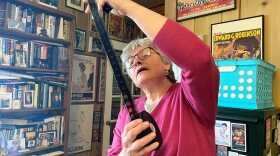For the past few years I have been addicted to ancestry-related TV shows such as PBS’s Finding Your Roots and the British series Who Do You Think You Are? As any viewer might do, I remember the particulars of those celebrities whose pasts, whose Ashkenazi Jewish roots, coincide with my own. That is one reason why the feature film Treasure, which was released in the U.S. in June and now is streamable, caught my attention.
Treasure is a German-French coproduction starring Stephen Fry and Lena Dunham. If you have seen their episodes on the ancestry shows, you will recognize them as having Ashkenazi Jewish roots, roots that give them histories in Eastern European ghettos and tragic Holocaust losses.
Therefore it is not a stretch to have Fry and Dunham commit to a film project about a father and daughter traveling from their New York home to Poland. The year is sometime in the early 1990s. The father Edek lived through the horrors of Auschwitz-Birkenau before migrating with his wife (also a survivor of the death camps) to New York. The daughter Ruth is a successful journalist who has rightly or wrongly ended her marriage.
Ruth may be savvy in New York lifestyle but she doesn’t know squat about making one’s way in Poland of the nineties where greasing palms with U.S. dollars was the most direct route to accomplishing almost any task. Once that principle is established, the story proceeds. Edek and Ruth have lost their wife/mother just one year previously. On top of dealing with the emotional tasks of connecting to a past of miseries, they deal with their own uneasy relationship.
As the two move around from Lodz to Warsaw to Krakow to the death camps, their weaknesses become evident. Edek gets near to but cannot really touch his past. He stands outside his old apartment building but hesitates to enter. Ruth has little patience for Edek’s ways – from his wearing the same egg-yolk-stained sweater every day to his ability to befriend a middle-aged woman he meets at one of the hotels.
Treasure was filmed mainly in Germany with some scenes shot in Poland. German filmmaker Julia von Heinz directed and cowrote Treasure as part three of an Aftermath trilogy of films about repercussions of the Holocaust in Germany and elsewhere. Her co-writer is her husband, scenarist/producer John Quester. The first two films are And Tomorrow the Entire World and Hanna’s Journey. Treasure is adapted from a 1999 autobiographical novel by Lily Brett titled Too Many Men.
This film impressed some American viewers and critics and greatly disappointed others. When the subjects are as serious, even as grim, as these, a film such as this one has a powerful impact. It interprets the Holocaust, the upheaval to Jews’ property by the Poles when the Jews were forced into concentration camps, as well as the theme of vulnerable family relationships.
Fry’s performance is outstanding. He speaks many of his lines in Polish, adroitly, convincingly. Treasure offers a story of solemn themes of historical weight, combined with intimate moments between a father and daughter that sometimes are pained and sometimes heartfelt.
Audrey Kupferberg is a film and video archivist and retired appraiser. She is lecturer emeritus and the former director of Film Studies at the University at Albany and co-authored several entertainment biographies with her late husband and creative partner, Rob Edelman.
The views expressed by commentators are solely those of the authors. They do not necessarily reflect the views of this station or its management.





